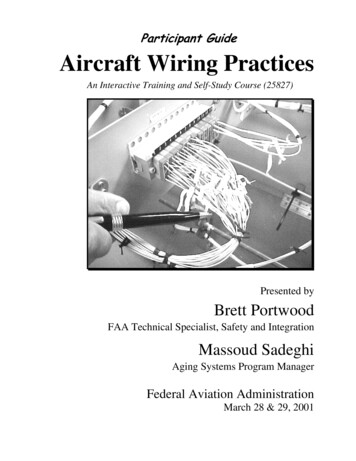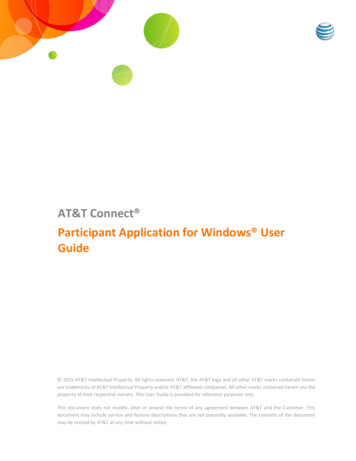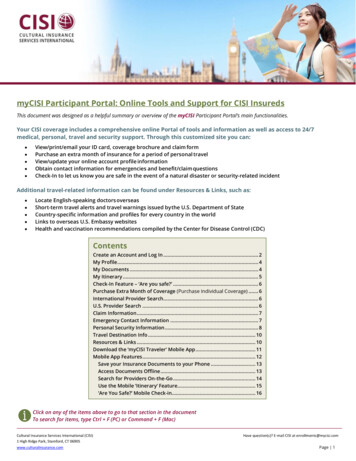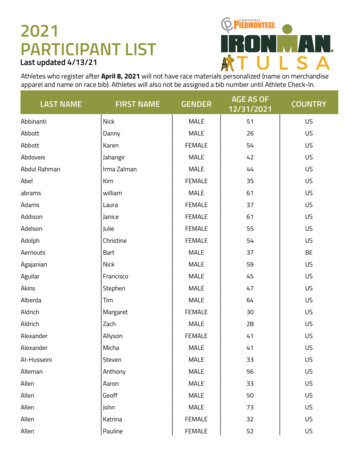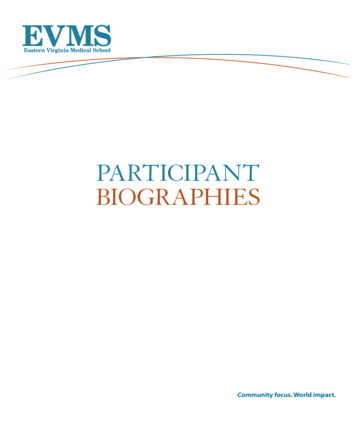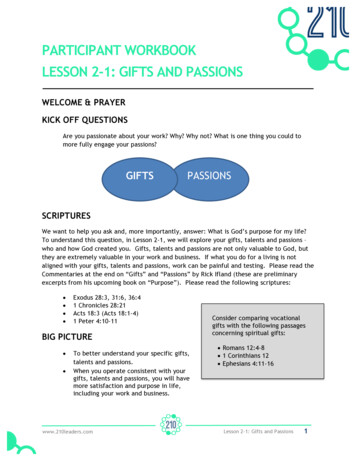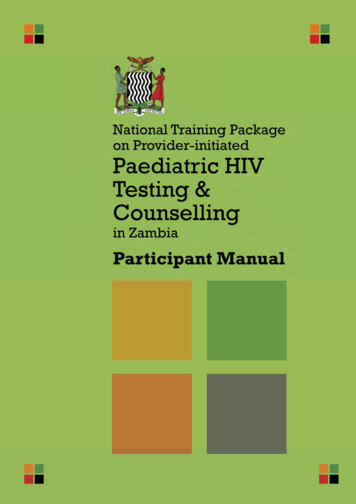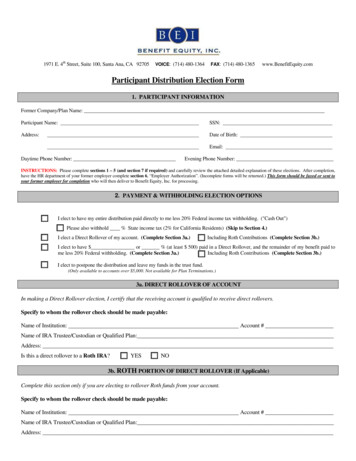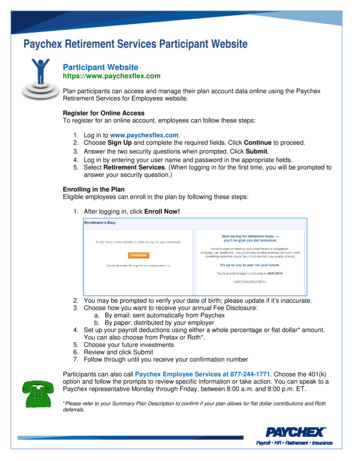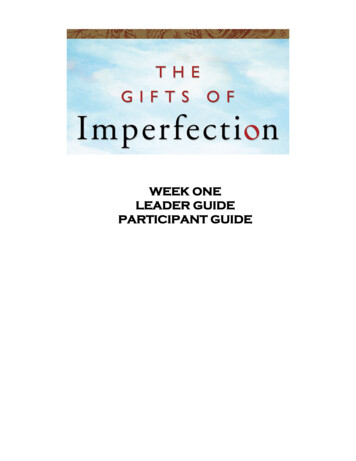
Transcription
WEEK ONELEADER GUIDEPARTICIPANT GUIDE
The Gifts ofImperfectionweek 1Owning our story and loving ourselves through that process is the bravest thing that we will ever do.Brene BrownOpening PrayerI will put my confidence in you and what I can accomplish in and through the divine that resides withinme.I come to you today positioning myself to be open to what I hear from you through these humanwords. I will put into practice the things you teach me through this work and these I journey with inthis work.Thank you, El Shaddai, for bringing me new boldness and courage may I become the mightyovercomer you know me to be.Thank you that you are giving me great power to do great things within my own life this day.Amen!IntroductionBB writes, Wholehearted living is about engaging in our lives from a place of worthiness. It meanscultivating the courage, compassion, and connection to wake up in the morning and think, No matterwhat gets done and how much is left undone, I am enough. It's going to bed at night thinking, Yes, Iam imperfect and vulnerable and sometimes afraid, but that doesn't change the truth that I am alsobrave and worthy oflove and belonging.Wholehearted living is not a onetime choice. It is a process. In fact, it's the journey of a lifetime. Thegoal of our work together is to bring awareness and clarity to the constellation of choices that lead toWholeheartedness and to share what we learn as we dedicate ourelves to living and loving with ourwhole hearts.The JourneyBefore embarking on any journey, including this one, it's important to talk about what we need tobring along.( P. 1)(Large group)What does it take to live and love from a place of worthiness?How do we embrace imperfection?How do we cultivate what we need and let go of the things that are holding us back?
Brown writes, The answers to all of these questions are courage, compassion, and connection— arethe tools, or daily practices, we need to work our way through our journey. Courage, compassion,and connection seem like big, lofty ideals. But in reality, they are daily practices that, when exercisedenough, become these incredible gifts in our lives. And the good news is that our vulnerabilities arewhat force us to call upon these amazing tools. Because we're human and so beautifully imperfect,we get to practice using our tools on a daily basis. In this way, courage, compassion, and connectionbecome gifts—the gifts of imperfection.How much we know and understand ourselves is critically important, but there is something that iseven more essential to living a Wholehearted life: loving ourselves. (Preface, p. xi)Question to the large group: How do you understand the differentiation between self-awareness andself love? (p. xi)(Individual question with small group discussion) I learned how to worry more about how I felt andless about “what people might think.” I was setting new boundaries and began to let go of my need toplease, perform and perfect. I started saying no rather than sure (and being resentful and pissed offlater). I began to say “Oh, hell yes!” rather than “Sounds fun, but I have lots of work to do” or “I’ll dothat when I’m (thinner, less busy, better prepared).” (Preface, p. xiii)When or with whom are you most likely to say “yes” when you mean “no”?Does that turn into resentment or blame?What would it take for you to practice “no”?Dig DeepBrown writes that in 2008, she made a decision to break her dig deep button. It's the button that werely on when we're too bone-tired to get up one more time in the middle of the night or to do one moreload of throwup-diarrhea laundry or to catch one more plane or to return one more call or to please /perform / perfect the way you normally do even when we just want to flip someone off and hide underthe covers. The dig-deep button is a secret level of pushing through when we're exhausted andoverwhelmed, and when there's too much to do and too little time for self-care. She made a promiseto herself that when she felt emotionally, physically, and spiritually done, she'd try slowing downrather than relying on her old standbys: pushing through, soldiering on, and sucking it up. Soundfamiliar to anyone?Brown writes, People who live whoe heartedly do indeed DIG Deep. They just do it in a different way.When they're exhausted and overwhelmed, they get
Deliberate in their thoughts and behaviors through prayer, meditation, or simply setting theirintentions;Inspired to make new and different choices;Going. They take action. (p.4)(Individual time to answer and share in small group) How do you traditionally “dig deep”?Can you think of a time in your life when you used a Wholehearted approach to DIG Deep?Courage, Compassion and ConnectionBrown writes, We can talk about courage and love and compassion until we sound like a greetingcard store, but unless we're willing to have an honest conversation about what gets in the way ofputting these into practice in our daily lives, we will never change. Never, ever.Courage sounds great, but we need to talk about how it requires us to let go of what other peoplethink, and for most of us, that's scary. Compassion is something we all want, but are we willing tolook at why boundary-setting and saying no is a critical component of compassion? Are we willing tosay no, even if we're disappointing someone? Connection is an essential component ofWholehearted living, but first we have to cultivate self-acceptance. (p.5)Brown writes, If we want to know why we're all so afraid to let our true selves be seen and known, wehave to first understand the power of shame and fear. If we can't stand up to the never good enoughand who do you think you are? we can't move forward.Owning our story can be hard but not nearly as difficult as spending our lives running from it.Embracing our vulnerabilities is risky but not nearly as dangerous as giving up on love and belongingand joy—the experiences that make us the most vulnerable. Only when we are brave enough toexplore the darkness will we discover the infinite power of our light.Why do you think this is such a struggle, practicing courage compassion and connection? Owning ourown story?Brown defines shame as the feeling of I am a mistake. She writes, The greatest gift of having donethis work is that I can recognize shame when it’s happening I also know that the very best thingto do when this is happening feels totally counterintuitive: Practice courage and reach out! We haveto own our story and share it with someone who has earned the right to hear it, someone whom wecan count on to respond with compassion. We need courage, compassion and connection. ASAP. (p. 9)But she cautions, If we share our shame story with the wrong person, they can easily become onemore piece of lying debris in an already dangerous storm. ( p. 10)
1.2.3.4.5.6.She writes, we definitely want to avoid the following:The friend who hears the story and actually feels shame for you. They gasp and confirms howhorrified you should be. Then there is awkward silence. Then you have to make them feel better.The friend who responds with sympathy (I feel so sorry for you) rather than empathy (I get it, I feelwith you, and I've been there). If you want to see a shame cyclone turn deadly, throw one of these atit: "Oh, you poor thing." Or, the incredibly passive-aggressive southern version of sympathy: "Blessyour heart."The friend who needs you to be the pillar of worthiness and authenticity. They can 't help becausethey are too disappointed in your imperfections. You've let them down.The friend who is so uncomfortable with vlllnerability that she scolds you: "How did you let thishappen? What were you thinking?" Or they look for someone to blame: Who was that person? We'llkick their ass."The friend who is all about making it better and, out of their own discomfort, refuses to acknowledgethat you can actually be crazy and make terrible choices: "You're exaggerating. It wasn't that bad.You rock. You're perfect. Everyone loves you.The friend who confuses "connection" with the opportunity to one-up you: "That's nothing. Listen towhat happened to me one time!"Browngives the previous six examples of responses we want to avoid while we are feeling shame.Would you add any responses to the list?Can you think of a time when you have reached out for connection and received one of theseresponses?Can you think of a time when you have been the person someone reaches out to for connection andyou gave one of these responses?Brown writes, When we're looking for compassion, we need someone who is deeply rooted, able tobend, and, most of all, we need someone who embraces us for our strengths and struggles. We needto honor our struggle by sharing it with someone who has earned the right to hear it. When we'relooking for compassion, it's about connecting with the right person at the right time about the rightissue. (p.11)Whom do you reach out to for genuine compassion? Identify three people who have earned the rightto hear your story.Who reaches out to you for genuine compassion?Courage is one of the most important qualities that Wholehearted people have in common. And notjust any kind of courage; I found that Wholeheartedness requires ordinary courage. The root of theword courage is cor—the Latin word for heart. In one of its earliest forms, the word courage had avery different definition than it does today. Courage originally meant "To speak one's mind by tellingall one's heart." Over time, this definition has changed, and, today, courage is more synonymous withbeing heroic. Heroics is important and we certainly need heroes, but I think we've lost touch with theidea that speaking honestly and openly about who we are, about what we're feeling, and about ourexperiences (good and bad) is the definition of courage. Heroics is often about putting our life on theline. Ordinary courage is about putting our vulnerability on the line. In today's world, that's prettyextraordinary. (p. 12)
How do you understand the difference between heroic courage and ordinary courage?Can you think of a time when you practiced ordinary courage? How did it feel? (p. 13) courage has a ripple effect. Every time we choose courage, we make everyone around us alittle better and the world a little braver. And our world could stand to be a little kinder and braver.(p. 15)Can you think of a time when you experienced the ripple effect of courage? What happened? Howwere you affected? (p. 15)CompassionIn her book The Places That Scare You, Pema Chödrön writes, "When we practice generatingcompassion, we can expect to experience the fear of our pain. Compassion practice is daring. Itinvolves learning to relax and allow ourselves to move gently toward what scares us. Compassion isnot a relationship between the healer and the wounded. It's a relationship between equals. Only whenwe know our own darkness well can we be present with the darkness of others. Compassionbecomes real when we recognize our shared humanity."There is vulnerability in practicing compassion. The word compassion is derived from the Latinwords pati and cum, meaning "to suffer with." Compassion is not our default response. Brown thinksour first response to pain—ours or someone else's— is to selfprotect. We protect ourselves bylooking for someone or something to blame. Or sometimes we shield ourselves by turning tojudgment or by immediately going into fix-it mode.Brown adds, Here's what I learned: The heart of compassion is really acceptance. The better we areat accepting ourselves and others, the more compassionate we become. Well, it's difficult to acceptpeople when they are hurting us or taking advantage of us or walking all over us. This research hastaught me that if we really want to practice compassion, we have to start by setting boundaries andholding people accountable for their behavior.Wouldn't it be better if we could be kinder, but firmer?How would our lives be different if there were less anger and more accountability?What would our work and home lives look like if we blamed less but had more respect forboundaries?ConnectionBrown describes connection as the energy that exists between people when they feel seen, heard,and valued; when they can give and receive without judgment; and when they derive sustenance andstrength from the relationship.Brown writes, We are wired for connection. It's in our biology. From the time we are born, we needconnection to thrive emotionally, physically, spiritually, and intellectually . Technology, for instance,has become a kind of imposter for connection, making us believe we're connected when we're really
not—at least not in the ways we need to be. In our technologycrazed wor14 we've confused beingcommunicative with feeling connected. Just because we're plugged in, doesn't mean we feel seenand heard . we also need to consider letting go of the myth of self-sufficiency. One of the greatestbarriers to connection is the cultural importance we place on "going it alone." Somehow we've cometo equate success with not needing anyone. Many of us are willing to extend a helping hand, butwe're very reluctant to reach out for help when we need it ourselves. It's as if we've divided the worldinto 'those who offer help" and "those who need help." The truth is that we are both.How do you practice connection?Have or do you consider technological communication as vehicle for connection?Do you reach out when in need? How so?The Wholehearted journey is not the path of least resistance. It's a path of consciousness and choice.And, to be honest, it's a little counterculture. The willingness to tell our stories, feel the pain of others,and stay genuinely connected in this disconnected world is not something we can do halfheartedly.Homework: Practice Courage, Compassion and ConnectionPracticing courage, compassion, and connection in our daily lives is how we cultivate worthiness. Thekey word is practice. Mary Daly, a theologian, writes, "Courage is
Imperfection week 1. Owning our story and loving ourselves through that process is the bravest thing that we will ever do. Brene Brown . Opening Prayer . I will put my confidence in you and what I can accomplish in and through the divine that resides within me. I come to you today positioning myself to be open to what I hear from you through these human words. I will put into practice the .


